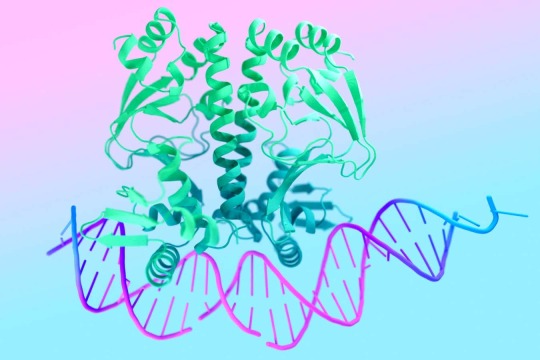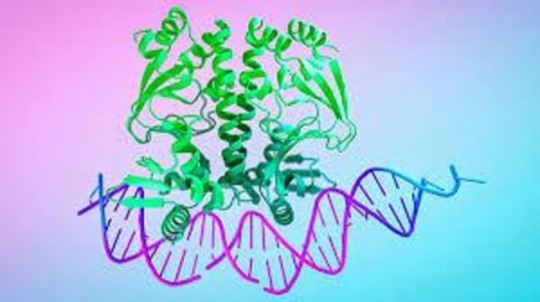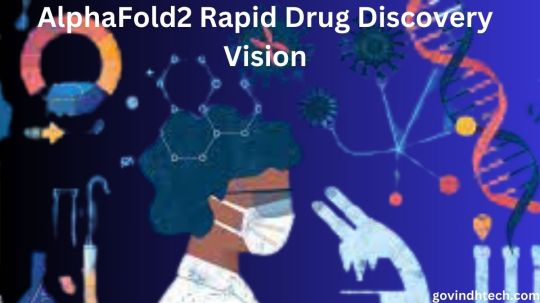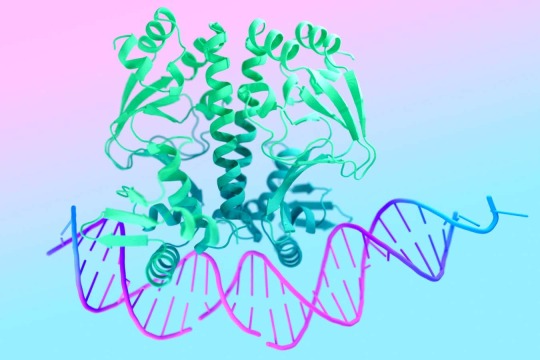#protein folding deepmind
Text
AlphaFold 3 by DeepMind: The Future of Protein Folding and Drug Discovery

A super artificial intelligence that is as smart as an architect and may predict the molecular configuration of proteins to a great extent.
Read More. https://www.sify.com/ai-analytics/alphafold-3-by-deepmind-the-future-of-protein-folding-and-drug-discovery/
0 notes
Text
DeepMind AI can predict how drugs interact with proteins
Visualization of protein binding to DNA molecule
Science Photo Library/Alamy
The artificial intelligence system now determines not only how proteins fold but also how they interact with other proteins, drug molecules or DNA. Biochemists and pharmaceutical researchers say the tool has the potential to speed up their work enormously, helping them discover new drugs.
Proteins, which play many…

View On WordPress
0 notes
Text
AlphaFold3 Transforming Medicine with AI

Google DeepMind and Isomorphic Labs came out with AlphaFold3. This smart tech helps us know more about how cells work. Before, AlphaFold fixed a big issue with how proteins fold. Now, AlphaFold3 goes further, guessing how things mix inside DNA and RNA.
Accelerating Scientific Discovery with AI
Biologists started using AlphaFold to find drugs faster. At the University of California, they used it to fight the coronavirus. Also, it helped a lot with studying malaria and Parkinson’s. AlphaFold3 is set to make these studies go even faster.
Understanding Cellular Machinery through AI
John Jumper from Google DeepMind said AlphaFold3 can show how cell parts interact. This is key for figuring out diseases and making new cures. Demis Hassabis, the boss of Google DeepMind, talked about the need to understand how life works at a moving, detailed level.
Read More:(https://theleadersglobe.com/life-interest/health/alphafold3-transforming-medicine-with-ai/)
#AlphaFold#drugs#Isomorphic Labs#global leader magazine#the leaders globe magazine#leadership magazine#world's leader magazine#article#best publication in the world#news#business#magazine
0 notes
Quote
Or how Google’s DeepMind AI had been able to predict the folding of proteins an order of magnitude faster than humans have been able to do. This is only the beginning of such augmentation that almost certainly will get better and better, and yet the world is struggling with the wicked problems of climate change.
The Case for Techno-Optimism Around AI
0 notes
Quote
AI for biology can’t draw on gobs of pre-existing data like the creators of ChatGPT did by scraping the internet for everything it contained. While there is useful biological data in public research databases, it’s not enough. AI can only craft solutions to problems similar to what it has seen, and in biology, there is still a lot we don’t know.
In the new AI-driven era, research efforts must be purposefully organized to generate the right data for AI models.
AlphaFold, the breakthrough protein structure prediction program from Google’s DeepMind, was trained using existing public databases like the Protein Data Bank (PDB), a massive collection of basic structural data on the molecules of life. But it only learned what the PDB contained, which tends toward smaller, soluble proteins that fold into a compact, globular shape. AlphaFold doesn’t do well predicting the structure of a number of important classes of protein. For example, it has difficulty figuring out protein-protein interactions (an important consideration for designing drugs). Nor is it necessarily adept at snapshotting how a single protein can change shape (which can be critical for function). And the structures of proteins which span cell membranes are more difficult to predict because relatively few have actually been solved. These important problems won’t go away without new data.
The Rise of “Wet” Artificial Intelligence - proto.life
0 notes
Text
AlphaFold2 Rapid Drug Discovery Vision Break Boundaries

Nuclera wants to use Google DeepMind to expedite the drug discovery process &Vertex AI’s AlphaFold2
The rapid protein access benchtop system from Nuclera, a biotechnology company based in the US and the UK, is being combined with AlphaFold2 (ref 1), a ground-breaking protein structure prediction tool from Google DeepMind, to serve the life science community. AlphaFold2 is hosted on Google Cloud’s Vertex AI machine learning platform.
Since proteins make about 95% of therapeutic targets, there is a growing need to generate various variants of active proteins to facilitate drug development. In particular, the discovery of compounds and biological leads requires accurate protein structure prediction.
The structural biology and drug development industries have been enthralled by AlphaFold2, a groundbreaking artificial intelligence tool that DeepMind published in 2021, since it represents a significant advancement in the accuracy of protein structure prediction (ref 2).
Combining the technologies of Google and Nuclera offers drug developers a new integrated approach to enhance protein construct creation and speed up the drug discovery process. Laser-guided protein design will soon be possible with the availability of high grade structures in a matter of minutes or hours. Furthermore, available will be dependable structures for proteins deemed “impossible” to describe experimentally.
Producing meaningful protein
Drug development relies heavily on the accessibility of proteins for lab-based research, which is notoriously expensive and difficult to acquire, placing time and budget constraints on research potential.
With its benchtop eProtein Discovery technology, Nuclera enables life science researchers to extract active proteins from DNA with the goal of improving human health. By combining digital microfluidics with cell-free protein synthesis on Smart Cartridges, Nuclera’s technology enables quick development on protein projects using an automated, high-throughput benchtop protein access system.
How Nuclera’s AlphaFold2 fits in: guided protein design
AlphaFold2 is an artificial intelligence (AI) model created by DeepMind that predicts the 3D structure of a protein based on its 1D amino acid sequence. It has been widely lauded as a breakthrough in biological research and a step forward in the production of vaccines and synthetic materials.
Nuclera’s cloud-based software will use AlphaFold2, which runs on Google Cloud’s Vertex AI, as a key component to enhance the quality and obtainability of proteins. With the use of Nuclera’s cloud software, users may now determine the best protein designs and conditions for protein scaling based on the results of expression and purification screens.
By providing an additional in silico filter during the experiment design phase, AlphaFold2’s integration with the eProtein Discovery Software improves the quality of constructs screened on the system and increases the likelihood of finding a truly optimal target protein on which to develop discovery programs. Moreover, AlphaFold2 will give users of eProtein Discovery profound insights into potential target protein designs, including any effects on folding, structural characteristics, and drug interactions.
Alphafold2 implementation on Vertex AI pipelines
Even though the AlphaFold2 algorithm has enormous potential, it’s vital to remember that it needs an operational model and serving infrastructure.
Predicting the structure of a protein requires a lot of computing power. Scaling up inference workflows can present difficulties, including as managing experiments, maximizing hardware resource consumption, and minimizing inference elapsed time.
In order to enable inference at scale, the Vertex AI solution for AlphaFold 2 prioritizes the following optimizations:
Parallelizing separate phases in the inference pipeline optimizes it.
utilizing the best hardware platform for each stage to maximize hardware usage and, consequently, expenses. The solution automatically provisioned and deprovisioned the computing resources needed for a step as part of this optimization.
presenting a strategy to experiment tracking that is both flexible and resilient, making it easier to execute and analyze hundreds of concurrent inference operations.
In order to create a scalable and resource-efficient AlphaFold pipeline, Nuclera will leverage the Vertex AI platform. Additionally, the company will leverage other Google Cloud services to expose the pipeline via an API and link it with its eProtein Discovery system.
What does the implementation setup entail?
The first goal that AlphaFold2 and Nuclera will accomplish is building a scalable API service that will allow users to access an AlphaFold2 instance running on Google Cloud. Secondly, a dashboard for analytics will be developed that will enable users to compare projected 3D structures for protein variations both statistically and graphically. Third, a feature called “protein of interest” (POI) recommendation will use intelligent selection algorithms to suggest to users potential synthetic protein variants (isoforms, truncations, mutations, orthologs, or fusions), while accounting for a number of constraints like conserved domains or computationally generated scores.
The relevance of eProtein Discovery/AlphaFold2’s application
With the aid of AlphaFold2’s 3D structural insights, Nuclera and its clients will be able to enhance the efficiency of their protein variant manufacturing procedure and learn more about the intricate relationships that exist between residues and the 3D folding protein structure.
The composite predictions provided by the AlphaFold2 module of the eProtein Discovery Software will help customers all over the world gain a better understanding of their proteins and make more informed decisions more quickly. This will ultimately save time needed to advance academic research and successfully find new drugs.
“AlphaFold2 integrated with Nuclera’s eProtein Discovery System is a really exciting demonstration of its practical use in drug discovery, enabling researchers to rapidly and efficiently design and produce proteins with the desired structure and function,” said Shweta Maniar, Global Director, Healthcare & Life Sciences Solutions, Google Cloud.
They are thrilled to be leading the way in the development of AI/ML-assisted drug discovery tools, which believe will accelerate the development of next-generation treatments. They are collaborating with Google Cloud and utilizing the amazing capabilities of AlphaFold2. Visit our GitHub repository to explore this solution in more detail and to test the universal and monomer pipelines that are included. The repository’s artifacts are made to allow for customization.
Read more on Govindhtech.com
0 notes
Text
From comments:
"They appear to have done a good thing here. Much like releasing the protein-folding-predicting AI that demolished all prior efforts in terms of predicting structures. They could've kept this trove of materials a trade secret and created Google Interesting Materials Co to profit from them, but they didn't.
When they exist and especially when they publish, the blue-sky R&D portions of almost any company usually do good work.
Makes you wonder what deepmind finds and then Google keeps to themselves though."
0 notes
Text
The Impact of AI and Big Data in Revolutionizing Pharmaceutical Research
In the ever-evolving landscape of pharmaceutical research, the convergence of Artificial Intelligence (AI) and Big Data has emerged as a transformative force, reshaping traditional approaches to drug discovery, development, and patient care. This fusion of cutting-edge technologies holds immense promise, revolutionizing the industry by accelerating the pace of innovation, enhancing precision, and optimizing outcomes.

Unveiling the Potential of AI and Big Data in Drug Discovery
Precision and Efficiency in Target Identification
The integration of AI-driven algorithms and machine learning models has fundamentally altered the process of identifying potential drug targets. These technologies can analyze vast datasets encompassing genetic, molecular, and clinical information with unprecedented precision. For instance, algorithms like AlphaFold have revolutionized protein folding prediction, allowing researchers to design drugs that precisely target specific protein structures. This accuracy expedites the identification of potential therapeutic targets and significantly reduces the time traditionally required for this critical phase of drug development.
AI and Big Data have transformed the landscape for Pharmaceutical Manufacturing Companies, expediting the identification of drug targets and aiding in the development of more effective medicines. By enabling more precise target identification, these technologies streamline the process, potentially reducing research and development costs while fostering the creation of novel therapies.
Accelerated Drug Development and Optimization
The conventional drug development pipeline is notorious for its prolonged duration and extensive resource requirements. However, AI has introduced efficiencies by streamlining various stages, including the screening of compound libraries, prediction of drug interactions, and optimization of lead compounds. For example, Atomwise's AI platform rapidly identified potential treatments for diseases such as Ebola and multiple sclerosis, showcasing the immense potential of AI in expediting drug discovery processes.
This accelerated drug development facilitated by AI and Big Data not only benefits Pharmaceutical Manufacturing Companies by potentially reducing the time-to-market for new drugs but also enhances the overall efficiency of the drug development process. It holds the promise of bringing lifesaving medications to market more swiftly, addressing critical health needs worldwide.
Enhancing Clinical Trials and Personalized Medicine
Optimizing Patient Stratification and Trial Design
The integration of AI and Big Data empowers researchers to analyze patient data comprehensively, enabling the identification of specific subpopulations that respond optimally to certain treatments. This in-depth analysis facilitates the customization of clinical trial protocols, ensuring that trials are tailored to target populations most likely to benefit. By refining trial designs in this manner, researchers can significantly reduce trial duration and costs while maximizing the likelihood of successful outcomes.
AI’s impact on Oncology Medicine Exporters is particularly notable in the realm of personalized medicine. IBM's Watson for Oncology, for instance, aids clinicians in making treatment decisions based on patient-specific data. This technology assists in identifying the most effective treatments tailored to individual patients, potentially revolutionizing cancer treatment strategies and improving patient outcomes.
Real-time Patient Monitoring and Predictive Analytics
In the realm of patient care, the marriage of AI and Big Data enables real-time monitoring and predictive analytics. Wearable devices and sensors continuously collect patient data, which, when coupled with AI algorithms, facilitate early detection of adverse events or disease progression. Google’s DeepMind Health, for instance, collaborates with clinicians to predict acute kidney injury in patients, allowing for proactive interventions and improved patient outcomes.
The integration of AI and Big Data in patient monitoring not only benefits healthcare providers but also presents opportunities for Pharmaceutical Manufacturing Companies involved in developing monitoring devices and systems. This expansion into healthcare technology further strengthens the link between pharmaceutical research and patient care.
Challenges and Ethical Considerations
Data Privacy and Security
As AI and Big Data rely heavily on extensive datasets, ensuring the privacy and security of patient data becomes a critical concern. Protecting sensitive medical information while harnessing the potential of these technologies demands robust protocols and ethical frameworks. Maintaining patient trust and compliance requires stringent measures to safeguard data against breaches or unauthorized access.
Bias and Interpretability in Algorithms
AI models are susceptible to biases inherent in the datasets they are trained on, potentially leading to skewed outcomes. Moreover, the lack of interpretability in some AI models poses challenges in understanding the decision-making process. Addressing these issues demands continual refinement of algorithms and transparent methodologies to minimize biases and enhance the interpretability of AI-generated insights.
Conclusion: A Paradigm Shift in Pharmaceutical Research
The amalgamation of AI and Big Data in pharmaceutical research signifies a paradigm shift, propelling the industry towards unprecedented advancements. These technologies catalyze the discovery of novel therapeutics, redefine patient care through personalized medicine, and optimize the efficiency of clinical trials. However, alongside these advancements, the industry must navigate challenges relating to data privacy, biases in algorithms, and ethical considerations.
As we embrace this era of innovation, collaborations between researchers, industry leaders, and regulatory bodies are pivotal. By fostering a symbiotic relationship between technology and humanity, we can harness the full potential of AI and Big Data, ushering in a new era of healthcare where precision, efficiency, and patient-centricity converge.
Credits : https://pharmaknowledgehubb.blogspot.com/2023/11/blog-post.html
#AIinHealthcare#BigDataAnalytics#DrugDiscovery#PrecisionMedicine#ClinicalTrials#PersonalizedMedicine#HealthTech#PharmaInnovation#PatientCare#HealthcareInnovation
0 notes
Text
DeepMind's AlphaFold-Latest is Pushing the Boundaries of Scientific Exploration
New Post has been published on https://thedigitalinsider.com/deepminds-alphafold-latest-is-pushing-the-boundaries-of-scientific-exploration/
DeepMind's AlphaFold-Latest is Pushing the Boundaries of Scientific Exploration
The model continues making breakthroughts in digital biology.
Created Using DALL-E 3
Next Week in The Sequence:
Edge 341: Our series about fine-tuning dives into a concept everyone should understand: prompt-tuning. We review the original prompt-tuning paper and the Axolotl fine-tuning framework.
Edge 342: Reviews one of the most fascinating papers of the year: Who is Harry Potter? which explores techniques for selective forgetting in LLMs.
You can subscribe below:
TheSequence is a reader-supported publication. To receive new posts and support my work, consider becoming a free or paid subscriber.
📝 Editorial: AlphaFold-Latest is Pushing the Boundaries of Scientific Exploration
The powering of scientific breakthroughs might be the purest definition of a Turing Test. New science requires the combination of sophisticated cognitive skills such as reasoning across disparate domains, experimentation, and a non-trivial dose of creativity and intuition. In recent years, we have seen various AI efforts venturing into scientific discovery. Among these, DeepMind’s AlphaFold has been widely regarded as the model that exemplifies the potential of AI for scientific exploration. Last week, DeepMind shared an update on their progress with the latest version of AlphaFold, known as AlphaFold-Latest.
AlphaFold stands as a prime example of innovation at the intersection of the two hottest trends in the current market: artificial intelligence and digital biology. The second version of AlphaFold amazed the scientific community a few years ago by achieving unprecedented accuracy in predicting protein structures from a given sequence of amino acids. This release was followed by AlphaFold-Multimer, which expanded the method to include other complexes containing protein elements. AlphaFold 2.3 took this work to a different scale by applying it to very large complexes. These incremental breakthroughs have paved the way for AlphaFold-Latest.
The current iteration of AlphaFold focuses on predicting structures of more complex biological systems. The work extends beyond proteins to structures containing nucleic acids, small molecule ligands, and modified or non-canonical residues. The combination of these structures is essential for understanding and predicting the behavior of biological mechanisms within a cell, which can, in turn, unlock predictions for incredibly complex biological systems. The implications are broad and far-reaching, from cancer drug discovery to new vaccines and pollution-resistant materials.
AlphaFold-Latest has demonstrated impressive performance, generating accurate predictions that go far beyond protein folding. The release of AlphaFold-Latest can accelerate scientific breakthroughs at an unprecedented speed and, hopefully, inspire a new generation of models in this space.
AI Hot Takes – Agree or Disagree?
Frank Liu, head of AI & ML at Zilliz, the company behind widely adopted open source vector database Milvus, shares his red hot takes on the latest topics in AI, ML, LLMs and more! Hear his reasons for why long-context models are NOT going to replace vector database to do RAG and how data contamination in LLMs isn’t a new problem in ML -> Watch Videos
🔎 ML Research
AlphaFold vNext
Google Deepmind shared an update about their protein-prediction model AlphaFold. The new version is able to generate predictions for most of the molecules included in the Protein Data Bank and its expanding onto other areas of digital biology —> Read more.
Zero-Shot-Reasoning Prompting
Google Research published a paper detailing a zero-shot reasoning technique with self-adaptive prompting. The method constructs pseudo-demonstrations for LLMs that can improve reaosning capabilities —> Read more.
EdiT5
Google Research published a paper detaling EdiT5, a transformer model based on the T5 architecture fine-tuned for grammar correction and text edition. EdiT5 is the model behind the grammar correction experience in Google Search → Read more.
DataFormulator
Microsoft Research published a paper detailing DataFormulator, an AI-first approach to data visualization. DataFormulator translates high-level visualization intent into low level data visualization actions —> Read more.
Foundation Models and Video Representations
Amazon Science published a paper introducing a technique called motion-guided masking(MGM) to track motion across video frames. The technique can help improve the extraction of semantic representations in foundation models for video —> Read more.
🤖 Cool AI Tech Releases
Embed v3
Cohere released the newest version of its embedding model —> Read more.
Stability AI Releases
Stability AI unveiled a series of new additions to its platform in areas such as image transformation, 3D and fine-tuning —> Read more.
🛠 Real World ML
LLM Architectures at GitHub
GitHub ML engineers discuss the architecture of LLMs apps —> Read more.
Walmart Enterprise Chatbot
Walmart discusses an architecture used to build enteprise chatbots based on LangChain, VectorDB and GPT-4 —> Read more.
📡AI Radar
Elon Musk’s x.ai might be releasing the first version of its model to selected parties next week.
AWS ., an interesting service that enables the reservation of GPU clusters in advance for a specific amount of time.
More than 70 attendees to the AI Safety Summit in the UK signed a letter about safety and openness in AI development.
Snowflake unveiled Cortex, a new platform for enterprise LLMs.
Yahoo big-data AI startup Vespa announced a $31 million series A.
Cranium raised $25 million for its enterprise AI security platform.
AMD delivered a strong quarter performance driven by the demand for AI chips.
AI defense platform Shield AI raised $200 million in new funding.
HubSpot announced the acquisition of Clearbit to enhance its AI capabilties.
Brave’s AI assistant is now available on its desktop edition.
TheSequence is a reader-supported publication. To receive new posts and support my work, consider becoming a free or paid subscriber.
#3d#acids#ai#ai assistant#ai safety summit#AlphaFold#amd#amino acids#amp#approach#apps#architecture#artificial#Artificial Intelligence#AWS#Behavior#Biology#Cancer#Canonical#cell#chatbots#chips#clusters#Community#contamination#creativity#dall-e#data#Data Visualization#Database
0 notes
Text
Alphabet Inc.’s DeepMind artificial intelligence division has racked up another scientific achievement.
The group this morning revealed that it has built an AI system capable of taking on what is considered to be one of the biggest challenges in biology today: simulating the shape of proteins.
The system, dubbed AlphaFold, took no less than two years to develop. DeepMind decided to announce the project after the software handily beat 97 other algorithms in the CASP simulation contest run by the U.S. National Institute of General Medical Sciences.
Read More: 3 Artificial Intelligence and Machine Learning Prediction for 2019
Proteins, which play a role in nearly every biological process, are chains of amino acids that twist and fold into various forms. The shape of a protein is one of the main factors that determine its behavior. A better understanding of these configurations could enable scientists to gain new insights into diseases believed to be caused by misfolded proteins and discover molecules that may be useful for drug development.
According to DeepMind, AlphaFold represents “significant progress” toward advancing this goal. The system can calculate what predict a protein will take solely based on what amino acids it includes and with an accuracy that the Alphabet subsidiary described as far higher than existing methods. That’s no small feat, considering how manually simulating every possible configuration of an average-sized protein would take longer than the age of the universe.
AlphaFold breaks down the task into two parts. First, the system uses information about a protein’s constituent amino acids to generate a three-dimensional model of its default (that is to say, unfolded) structure.
“Some of the more predictions that we are thought to do are: (a) the distances between pairs of amino acids and (b) the angles between chemical bonds that connect those amino acids,” DeepMind explained. “As of now we are also in a way to become a trained a neural network to predict a separate distribution of distances between every pair of residues in a protein. These probabilities were then combined into a score that estimates how accurate a proposed protein structure is.”
Read More: Honor 8C will be launching in India today
Once the 3-D model is ready, AlphaFold figures out the shape the protein most likely to take. It does so by taking advantage of the fact that all proteins are predisposed to fold into the most energy-efficient form available, which helps narrow down the possibilities. The AI tries out different variations of the 3-D model to generate more efficient versions until it finds the optimal form.
AlphaFold initially took two weeks to generate a prediction, according to The Guardian, but can now complete the task in a couple of hours. It beat the 97 other algorithms tested in the CASP simulation contest by accurately predicting 25 out of the 43 provided proteins. The runner-up correctly predicted just three.
Read More: Best Fat-Burning Coconut Cookies You Can Eat For Morning Meal to Increase Your Metabolism
0 notes
Text
DeepMind AI can predict how drugs interact with proteins
Visualization of protein binding to DNA molecule
Science Photo Library/Alamy
The artificial intelligence system now determines not only how proteins fold but also how they interact with other proteins, drug molecules or DNA. Biochemists and pharmaceutical researchers say the tool has the potential to speed up their work enormously, helping them discover new drugs.
Proteins, which play many…

View On WordPress
0 notes
Text
The artificial intelligence (AI) landscape has rapidly changed in recent years, with AI projects showcasing breakthroughs in various fields such as healthcare, finance, and transportation.
With AI becoming increasingly intertwined with our daily lives, staying updated on the latest developments is essential. In this article, we'll explore the top 20 AI projects, shedding light on the future of AI technology and its potential impact on our world.
What is Artificial Intelligence?
Artificial intelligence (AI) has become a crucial driving force behind numerous technological advancements in the 21st century, evolving from a concept of science fiction to a tangible reality shaping our everyday lives. AI encompasses various subfields, including machine learning, natural language processing, computer vision, and robotics.
These cutting-edge technologies have the potential to revolutionize industries, enhance human capabilities, and address some of the most pressing global challenges.
In recent years, AI has demonstrated its prowess in various applications, from automating mundane tasks to tackling complex problems once considered impossible for machines. As AI advances, it offers promising solutions to healthcare, education, climate change, and beyond issues.
However, the rapid development of AI also raises important ethical questions and concerns about its impact on society, employment, and privacy.
In this article, we will delve into the world of artificial intelligence by exploring the top 20 AI projects currently shaping the future of this transformative technology. These projects serve as a testament to AI's incredible potential while highlighting the need for ongoing research, collaboration, and responsible innovation.
By staying informed about these groundbreaking AI projects, we can better understand the trajectory of AI's development and its potential implications for our world.
Top 20 AI Projects
OpenAI's
GPT-4 OpenAI's GPT-4 is the latest powerful language model series iteration that can generate human-like text, perform translations, and answer questions. Its ability to understand and generate complex content has revolutionized AI's capabilities in natural language processing.
DeepMind's AlphaFold
DeepMind's AlphaFold is an AI-driven protein folding prediction system that accurately predicts protein structures, allowing researchers to unlock new treatments and cures for various diseases.
Tesla's Full Self-Driving (FSD)
Tesla's Full Self-Driving (FSD) technology is an AI project that aims to provide Level 5 autonomy, making human intervention unnecessary during a vehicle's operation. It has the potential to revolutionize transportation by improving road safety and efficiency.
Boston Dynamics' Atlas
Atlas is a humanoid robot developed by Boston Dynamics, capable of performing tasks with human-like skill and agility. This advanced AI project showcases the possibilities of robotics in both industrial and everyday applications.
IBM Watson
IBM Watson is an AI-powered supercomputer that can understand and process natural language, enabling it to answer questions, provide recommendations, and analyze large datasets. Watson has been utilized in various industries, including healthcare, finance, and customer service.
Project Debater
Developed by IBM Research, Project Debater is an AI system that can engage in a live debate with humans, presenting well-structured arguments and counterarguments. This AI project demonstrates the potential for AI-driven decision-making and critical thinking.
Google's DeepMind AlphaGo
AlphaGo, developed by Google's DeepMind, is an AI system that defeated the world's top Go players, a previously considered impossible for AI. AlphaGo demonstrates the capacity of AI to learn complex strategies and adapt to new situations.
NVIDIA's Jarvis
Jarvis, developed by NVIDIA, is an AI-powered platform that enables developers to create
conversational AI applications with speech recognition, natural language understanding, and speech synthesis capabilities.
Vicarious Surgical's Robotic-Assisted Surgery Vicarious
Surgical is developing AI-driven robotic systems to assist surgeons in minimally invasive procedures, improving precision and reducing patient recovery time.
Neuralink's Brain-Computer Interface
(BCI) Neuralink, founded by Elon Musk, aims to develop a high-bandwidth brain-computer interface (BCI) that enables seamless communication between the human brain and AI, potentially transforming how we interact with technology.
Waymo's Autonomous Vehicles
Waymo, a subsidiary of Alphabet, has been developing self-driving cars that use AI-powered systems to navigate complex urban environments, potentially revolutionizing transportation and reducing accidents.
Microsoft's Project Natick
Project Natick is an innovative underwater data center initiative by Microsoft, leveraging AI to monitor and maintain the submerged servers, increasing energy efficiency and reducing environmental impact.
OpenAI's Codex
Codex, developed by OpenAI, is an AI system that understands and generates code in various programming languages. It can potentially revolutionize software development by assisting programmers in writing code more efficiently and accurately.
AIVA Technologies' AI Music Composer
AIVA Technologies has developed an AI-powered music composer to generate original music compositions in various styles and genres. This AI project can potentially reshape the music industry by providing personalized soundtracks and assisting musicians in their creative processes.
Google's Project Loon Project
Loon is an initiative by Google to provide internet access to remote and underserved areas using high-altitude balloons. The project uses AI algorithms to optimize balloon navigation and coverage, aiming to bridge the digital divide.
Ayasdi's AI-Powered Healthcare Solutions
Ayasdi is a healthcare AI company that utilizes machine learning and data analysis to improve patient care, reduce costs, and streamline clinical workflows. Their AI-driven solutions have been used in various areas, including disease prediction, drug discovery, and treatment optimization.
Blue River Technology's See & Spray
See & Spray, developed by Blue River Technology, is an AI-driven agricultural system that uses machine learning and computer vision to identify and precisely apply pesticides only to weeds, reducing chemical usage and improving crop yields.
OpenAI's Dactyl
Dactyl, another project by OpenAI, is a robotic hand that can manipulate objects with human-like dexterity. This AI-driven system can potentially revolutionize industrial automation and assistive technologies for people with disabilities.
Facebook's DeepFace
DeepFace, developed by Facebook, is an AI facial recognition system with an accuracy rate of 97.25%, rivaling human performance. This AI project demonstrates the potential for advanced security applications and personalized user experiences.
Google's AutoML
Google's AutoML is an AI platform that enables developers to build custom machine learning models without requiring expertise in machine learning. This AI project has the potential to democratize access to AI technology and empower businesses to harness its power for various applications.
In conclusion, these top 20 AI projects demonstrate the remarkable advancements in artificial intelligence and its potential to reshape industries, enhance our lives, and unlock new possibilities for humanity. Staying informed about these projects is essential to understanding the future of AI and its role in our rapidly changing world.
0 notes
Text
Google Brain, protein-folding DeepMind fold into one
http://i.securitythinkingcap.com/SmqCT9
0 notes
Text
Ray Kurzweil Predicted Simulated Biology is a Path to Longevity Escape Velocity
There is a lot of reports that Ray Kurzweil predicted immortality will be achieved by 2030. Here is the section of the September, 2022 interview with Lex Fridman where Ray talked about Longevity Escape velocity starting around 2030.
His belief is based upon going all in with rapidly improving AI to speed the advance of antiaging medicine. I get to the specifics of Ray’s beliefs and statements and the actual work of applying AI to accelerate drug discovery and progress with antiaging work.
Demis Hassabis and Deep Mind developed Alphafold to solve protein folding. This is the leading edge of AI for accelerate drug discovery.
The significance of AlphaFold
AlphaFold has demonstrated significant progress in tackling the protein-folding problem. Hassabis shared, “Prior to us entering the field with AlphaFold 1 in 2018, and then AlphaFold 2 in 2020, if we look at the decade of progress before that, from 2006 to 2016, on the previous CASP editions, you can see that essentially there’d been no progress for pretty much a decade.”
AlphaFold, a system capable of predicting protein structures with remarkable accuracy, could have far-reaching implications for the future of drug discovery and development. Hassabis believes that this groundbreaking technology will usher in a new era of digital biology, saying, “AlphaFold, I think, is that proof of concept.” He added that the system promises to herald “the dawn of a new era of what we like to refer to as ‘digital biology.’”
AlphaFold is not the only system from a tech company focused on proteins. Scientists at Facebook’s parent Meta have also developed an AI language model known as ESMFold to predict the unknown structures of more than 600 million proteins pertaining to viruses, bacteria and other microbes. The researchers repurposed the model, first designed for decoding human languages, to make accurate predictions regarding proteins’ 3D structure.
Virtual Cell
Deepmind is also working on a number of other projects in chemistry and biology to expedite the drug discovery process. Hassabis envisions the development of a “virtual cell” that models all cellular dynamics and can be used to perform in silico experiments. This would streamline the research process, requiring wet lab validation only at the final stage.
Meta and Deepmind could both offer useful approaches. That is, ESMFold’s speed advantage could complement AlphaFold’s higher accuracy. Researchers could potentially use ESMFold for initial predictions or for large-scale projects, and then refine the results using AlphaFold for specific proteins of interest. This combination could optimize the research process and maximize the benefits of both models.
Breakthroughs like AlphaFold and ESMFold have the potential to catalyze progress drug discovery and other scientific fields, potentially helping usher in a new era in digital biology. Hassabis’ presentation showcased DeepMind’s ambitious vision, while stressing the need for safety, responsibility and ethics in AI development.
A Virtual Cell could be achieved by 2030 and it could speed up some work. It could then be expanded to virtual organs and then virtual bodies for fast virtual clinical trials.

Ray believes there is an accelerating pace of technology and the growing power of AI is now widely accepted. The biotechnology revolution has arrived and has begun to radically change the way medical problems are solved. As these concepts become reality, the question of whether we want to live forever is becoming less theoretical and more real. Here is an excerpt from that Singularity University Alumni conversation.
Ray on Simulating Biology – Applying AI to Biology
Ray said — We are now applying AI to life extension. We’re actually simulating biology, so we can now do tests with simulated biology. Take the Moderna vaccine for example. They actually tested several billion different mRNA sequences and found ones that could create a vaccine. They did this in three days and that was the vaccine. They then spent ten months testing it on humans, but it never changed. It remained the same and it’s the same today. Ultimately, we won’t need to test on humans. We will be able to test on a million simulated humans which will be much better than testing on a few hundred real humans.
It is good that we had the vaccine otherwise many more people would have died. I’m not saying we’re there yet but we are beginning to simulate biology and ultimately we’ll find solutions to all the problems we have in medicine using simulated biology. So, we’ve just begun. I think we’ll see that being very prominent by the end of this decade. But people have to want to live forever. If they avoid solutions to problems then they won’t take advantage of these advances. So we’ll have the opportunity, but that doesn’t mean everybody will do it.

Brian Wang is a Futurist Thought Leader and a popular Science blogger with 1 million readers per month. His blog Nextbigfuture.com is ranked #1 Science News Blog. It covers many disruptive technology and trends including Space, Robotics, Artificial Intelligence, Medicine, Anti-aging Biotechnology, and Nanotechnology.
Known for identifying cutting edge technologies, he is currently a Co-Founder of a startup and fundraiser for high potential early-stage companies. He is the Head of Research for Allocations for deep technology investments and an Angel Investor at Space Angels.
A frequent speaker at corporations, he has been a TEDx speaker, a Singularity University speaker and guest at numerous interviews for radio and podcasts. He is open to public speaking and advising engagements.
0 notes
Text
Summary of DeepMind's AlphaFold 2 Explained! AI Breakthrough in Protein Folding! What we know (& what we don't)
Summary of DeepMind’s AlphaFold 2 Explained! AI Breakthrough in Protein Folding! What we know (& what we don’t)
00:00:00 – 00:50:00
DeepMind’s AlphaFold 2 algorithm is a deep learning algorithm that can predict the structure of proteins. The algorithm takes in multiple sequence alignment data as features and uses a convolutional neural network to produce a predicted structure. The algorithm is based on a deep learning approach, and is able to use a variety of features to predict the structure of…

View On WordPress
0 notes
Text
Siri or Skynet? How to separate AI fact from fiction
Siri or Skynet? How to separate AI fact from fiction Siri or Skynet? How to separate AI fact from fiction
Determining the way artificial intelligence is used and governed will be one of the century’s key political battlegrounds. Here’s what everyone needs to know
“Google fires engineer who contended its AI technology was sentient.” “Chess robot grabs and breaks finger of seven-year-old opponent.” “DeepMind’s protein-folding AI cracks biology’s biggest problem.” A new discovery (or debacle) is reported practically every week, sometimes exaggerated, sometimes not. Should we be exultant? Terrified? Policymakers struggle to know what to make of AI and it’s hard for the lay reader to sort through all the headlines, much less to know what to be believe. Here are four things every reader should know.
First, AI is real and here to stay. And it matters. If you care about the world we live in, and how that world is likely to change in the coming years and decades, you should care as much about the trajectory of AI as you might about forthcoming elections or the science of climate breakdown. What happens next in AI, over the coming years and decades, will affect us all. Electricity, computers, the internet, smartphones and social networking have all changed our lives, radically, sometimes for better, sometimes for worse, and AI will, too.
Continue reading... https://ift.tt/pjEH7bv https://ift.tt/PpS30cE
0 notes